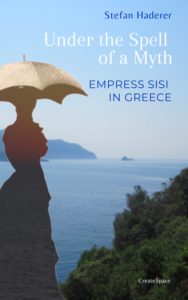“The Empress,” arrived on Netflix last month and quickly landed a spot in the streaming service's top ten trending shows.
Entitled “Die Kaiserin” in its original German, “The Empress,” is a historical drama based on a true story about Elisabeth “Sisi” von Wittelsbach, Princess of Bavaria and her journey to becoming the Empress of Austria for 44 years.
Famed for her beauty, Empress Sisi Elizabeth of Austria was a celebrity of her day who set fashion trends and loved horse riding and travelling.
Born as a duchess, Empress Sisi was way ahead of her time. She was a rebel, always looking for ways to escape the strict protocol of the Habsburg court, and her mother-in-law. Her story is well known through many books and films which mostly paint a romantic picture that could not be further from reality. Sisi was beautiful, but also depressed, lonely, misunderstood and probably suffering from eating disorder.
What is also little known about Empress Sisi was her special relationship with Greece and its people - a subject that provides the central theme for a new book by Stefan Haderer; ‘Under the Spell of a Myth: Empress Sisi in Greece’.
Greek City Times speaks to Haderer to learn more about his new book which tells the unknown story of the captivating Empress Sisi and the time that she spent in Greece.
[su_custom_gallery source="media: 218809" link="attachment" width="600" height="450" title="always"]Tell us about the title you chose for your book – Under the Spell of a Myth? Why did you choose this title?
All her life Empress Elisabeth, called Sisi. was intrigued by different myths: the myth of beauty (her own and of the young and strong Greek heroes and gods she adored), the myth of youth, and the myths of Greece, a country she fell in love with and escaped to when her inner world was falling apart. Unravelling these myths and Sisi’s own legend was my key motivation to write this book.
How did you become interested in Empress Sisi? Specifically, what drew you to learn more about time she spent in Greece? Why was this period of her life significant?
I’ve always been fascinated by 19th century characters. Elisabeth was so special because, although she was a royal, she tried to live the life of a private person and of a modern woman. Of course, considering her high rank, this was way easier for aristocratic women and artists than for working class women.
I was mesmerised by the diaries of Sisi’s most famous reader, Constantin Christomanos. His pure and magical language and descriptions of the few months he accompanied the Empress on her travels certainly is compelling and inspiring. So I wanted to find out more – and discovered that there were nine other young Greek men who were Sisi’s readers and with whom she spent time in Greece. Through their eyes we finally get an idea of the ageing Empress, of a sad and highly gifted woman whom her son Rudolf once called “the philosopher on the throne”. I believe her experiences in Greece and her poems are essential to understand Sisi’s mind and thoughts.
[su_custom_gallery source="media: 218808,218807,218804" link="attachment" width="600" height="900" title="always"]Why did Empress Sisi travel to Greece and what was the reason for her spending time there? Can you tell us a bit about her special relationship with Greece and its people?
Elisabeth landed on Corfu as a young girl in her first marriage crisis. I think she felt nostalgic about the nice time she spent on the island, far from the court and the ceremonial she abhorred. 20 years later she wanted to rediscover the country she associated with mystical heroes, freedom fighters, beautiful nature and hospitable people who didn’t even know the modest lady in black was an Empress. The hero Achilles became her idol, the dolphin her symbol and the Achilleion, the white palace she built on Corfu, her place of refuge and seclusion.
In my book I wanted to shed light on how the others saw the Empress without idealising her. For instance, few people know Sisi gave the girls jewellery, bought cattle from the farmers and oranges from landowners, or donated a fountain to the villagers so they wouldn’t have to march to the distant river. The people saw her as a generous lady, although she remained aloof and inapproachable to many. To her Greek teachers, who could have been her sons, Sisi was surprisingly outgoing and familiar. This ambiguity, in my opinion, is one of her special character traits.
[su_custom_gallery source="media: 218802,218803" link="attachment" width="600" height="900" title="always"]You have conducted extensive research in various places in Greece. Can you tell us about your time spent in Greece and the process you undertook to undertake the relevant research?
I’ve been to Greece more than ten times and visited different places Sisi also saw on her trips: Corfu and her palace, of course, but also Athens, the ruins of Mycenae and other islands like Lefkada and Santorini. In the first Corona lockdown I finally decided to write the book and use the material I had collected from archives (many of them digital archives). A lot of Greeks helped me with my research, especially local people from Corfu. I am really grateful to all of them! A lot of material in archives has been lost, but newspaper reports and diary notes have survived. One advantage was that I speak and read Modern Greek and could therefore analyse the historic material, especially about Sisi’s ten readers.
“Her life was a great romance, her death a tragedy.” Xavier Paoli
Why do you think Empress Sisi was so intriguing? Why do you think people were so captivated by her?
As I mentioned in my book, Sisi used to cultivate her image of a forever young and beautiful Empress. Thanks to the lack of mass media, professional photography and film this was possible. However, we forget that her beauty was fading in her fifties. Although Elisabeth was vain, she didn’t want to disguise it by using cosmetics. Instead, she kept hiding her wrinkled and tanned face behind a fan and an umbrella. Unfortunately, today’s producers of movies and series love keeping this fairytale cliché alive, including her eccentricities. Elisabeth’s security man, Xavier Paoli, once wrote: “Her life was a great romance, her death a tragedy.” I guess this is the reason Sisi keeps fascinating us even today.
Under the Spell of a Myth
Empress Sisi in Greece
by Stefan Haderer
ISBN: 979-8844219504
KDP Publishing, 247 pages, paperback, color print
Price: 27€ / £21.75 / 25 US$
Now available at Hoogstraten Online Shop (Netherlands), Payot Libraire (Switzerland), in all Amazon shops (amazon.com, amazon.co.uk, amazon.fr, amazon.de and others). Available as an ebook in Australia.
Read also The World’s Best Vineyards in Greece



